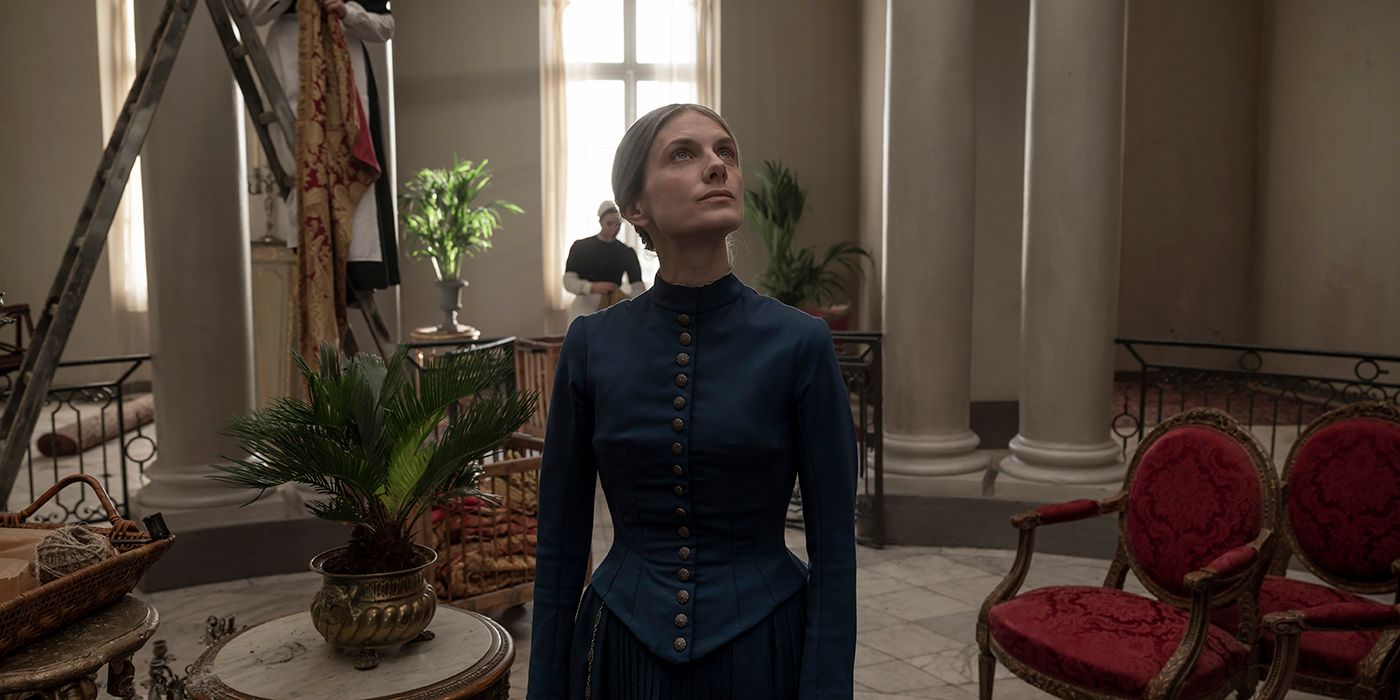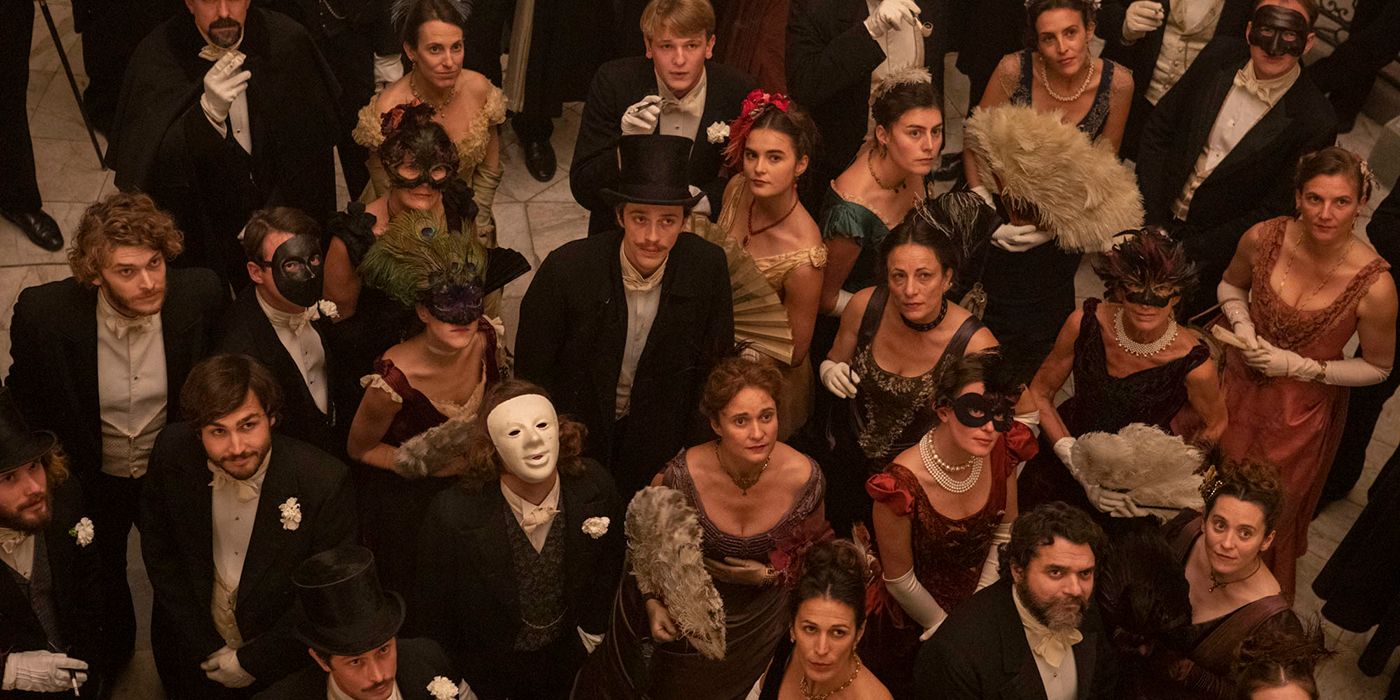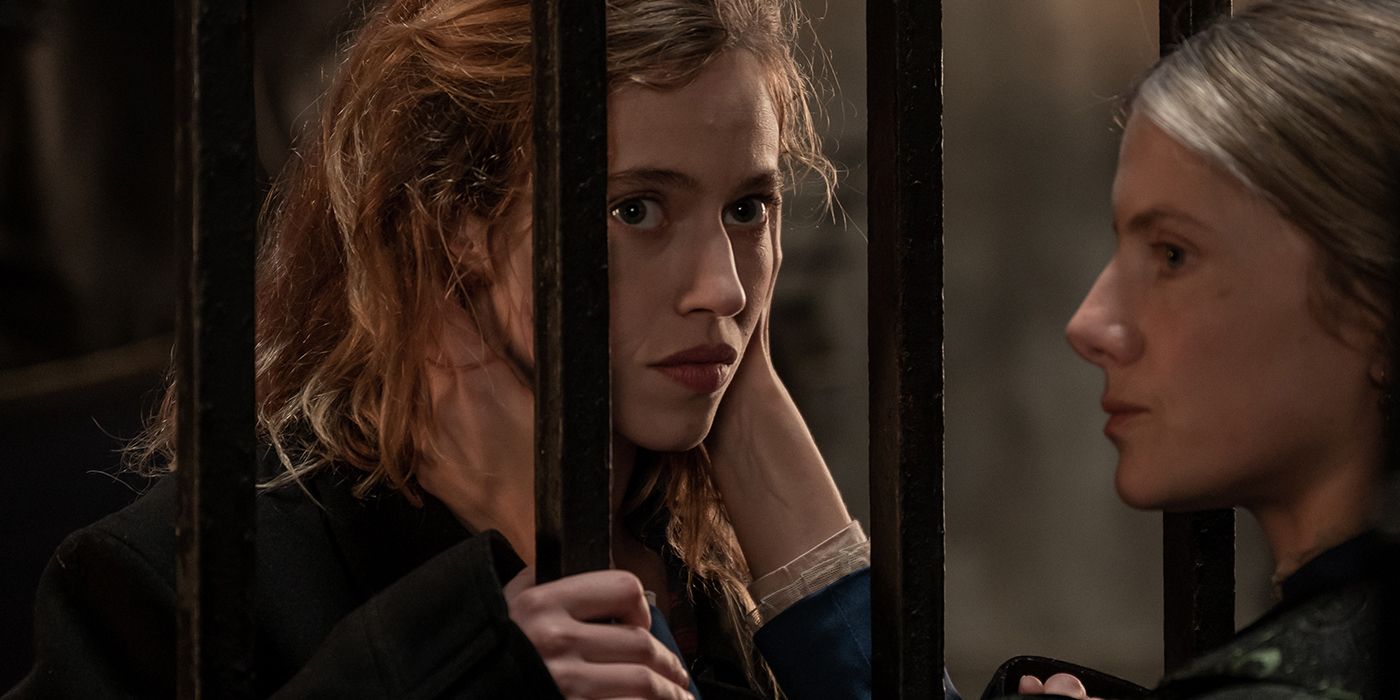Acclaimed actress Mélanie Laurent steps behind the camera once more to direct The Mad Women's Ball, which arrives September 17 on Amazon Prime Video. Based on the novel Le Bal des Folles by Victoria Mas with a screenplay co-written by Laurent herself, the story centers on a young woman whose apparent supernatural abilities get her unfairly institutionalized and turn her into the subject of immoral experiments.
When Eugénie (Lou de Laâge, who has collaborated with the director before) learns she can speak to spirits, she tries to use this gift to help her family. Instead of thanking her, they send her to a hospital to be subjected to invasive treatments by doctors who don't care about their patients. She and her fellow patients are simultaneously being prepared for a public ball where they will be the talk of the town, but only nurse Geneviève (Laurent) seems to want to help them.
The multitalented star spoke to Screen Rant about finding feminism in the story without making it the whole story, and about what it feels like to act in her own work.
Screen Rant: How did you first hear about The Mad Women’s Ball, and what inspired you to take it on?
Mélanie Laurent: Sometimes I feel like it was meant to be. I was looking for a strong story; I was kind of obsessed [with] making a feminist movie, but I didn't want feminism to be the heart of the movie. I wanted to talk about more subjects, and I also wanted to do a period movie. I thought it would be modern to talk about a period of history as a reminder, instead of doing a contemporary story.
And then, by magic, my producer Alain Goldman showed up with the book. He said, "Read that and tell me what you think." And when I read it, I was like, "Oh my God, that's exactly what I'm looking for." The was timing was perfect.
You said you wanted to tell a story that had feminism without making it the center of that story. How did you balance the social commentary aspects with just the story of these women as a dramatic narrative?
Mélanie Laurent: That's why I was amazed by that book because I felt like everything was there. You have what's going on in society, you have spiritism, and you have many other subjects.
Victor Hugo was allowed to have a spirit session to talk with his daughter, and he was fine. Her brother can be gay and have a double life, and he won't be dragged to a hospital to get healed - which is funny when you think about it, because that's what happens in so many countries today. And you're like, "Oh my God, we go back to that craziness when we've had a century to see how absurd it was."
I just thought it was amazing for me to just travel to all those themes of politics and, underneath that, the love story of a beautiful friendship. It's talking about death, talking about belief, talking about medicine, and talking about all those women together who feel so warm and beautiful. They're not sick or ill at all; they're different but beautiful. I had so many things [to work with].
Speaking of the women, Eugénie and Geneviève have such a lovely relationship. How did you cast Lou de Laâge, and what was it like to build that story together?
Mélanie Laurent: Lou is one of my favorite human beings. I worked with her seven years ago, when I directed a movie called Breathe and she was one of my leads. I called her saying, "Hey, it's been too long."
I love her; she's such a good partner. She's such a beautiful soul and so strong. She knows her line, she's in on time, she never complains - she's there with you and for you. She loves making movies, and there is no drama. There is no time for anything annoying; it's just working and taking pleasure in telling a story, which is super rare and really amazing. I'm actually very lucky.
And it's also beautiful for me to see her grow up. She's probably seeing me grow old, but I'm seeing her changing.
You are growing and expanding in the roles that you take on. What is it like to really juggle all these hats, in terms of writing and directing a film you also star in?
Mélanie Laurent: Every time I'm playing in my movies, there is always a production reason. I never really want to play my movies; it's always a producer who's like, "It would be so much easier..."
For that particular movie, we wrote the script during the first lockdown. Then we shot them up during the second wave, and that was such a mess. It was so hard to set up a movie at that moment. So, obviously, it was easier prediction-wise to be like, "Can you just be the lead also?"
But I'm always taking pleasure, and I never regret it. I love being on set with my actors and going through the scenes with them. Sometimes I don't say anything, and I'm directing them through the scenes and through the lines and everything. It's kind of magical to share that.
And it's so funny, because if you ask my actors how it is to work with me as an actor and director, they always say, "She's also a mom." Because I had my super small baby with me; she was a year and a half. She was always on me. I was wearing a costume, wearing my baby, and doing rehearsals with my actors and my baby. So, for many actresses, the image of me being a director on set and an actor was like, "Well, she has a baby." A cute baby who doesn't say anything.
I thought it was really interesting the way that you approach Eugénie's spirits because you don't really show the ghosts or delve into the supernatural side. Instead, it was very much internal for her. Can you talk about the choice behind that?
Mélanie Laurent: Yeah, that was funny, because the book was describing the ghosts. They were here, and they could smell them having a perfume sometimes. I was like, "I don't know if I want to do that." Because if I'm doing that, it's a ghost movie and a genre movie.
I want the audience to feel free to believe in whatever they want to believe, as Geneviève and as Jeannne and as so many other characters around her do. There are people scared of that, and there are people who are really desperate to believe in something to feel less pain. And there are people who are totally not going to go into that. I thought that if you don't see any spirits, then you're free to believe anything you want. Instead of making a ghost story, I really wanted to make a movie about belief.
I know the Mad Women's Ball was a real event as well. How much did you take from the novel versus doing research about the historical accuracy?
Mélanie Laurent: What I liked about it is I didn't have a lot of things to research. I was pretty free to do whatever I wanted.
I had a few drawings that looked very small, and then I had articles from journalists saying this is the event of the year. And the journalists were describing something so creepy, like people from the outside world wanting to see the crazy women and touch them. Everybody was drunk, everybody had sex, and it was insane. It was creepy, because they had only that moment of fun, but everybody was molesting them and abusing them. On top of the rest, they had that moment of humiliation.
But what I loved about it as a symbol and something cinematographic was for me to prove who are the crazy ones. That was my way to also say, "It's not just about the men, it's not just about those doctors." It's about society seeing those women, judging them, and making fun of them. But they are the beautiful ones, they are the strong ones, and they are the most powerful ones.
You mentioned Théophile (Benjamin Voisin), the brother, and I really loved the dynamic between him and Eugénie. It's almost unfair that she's the only one sent off while he can be free to do what he wants, and yet there is still that love between them. Can you talk about that family bond?
Mélanie Laurent: In the book, even the brother was kind of tough with her - so I felt like we needed to save one man. They're too awful; it cannot be true. Also, it needed to be heartbreaking to us and to the audience for her to go somewhere. Because I felt in the book, she was judged and that whole family was so cold.
I think it's something that works for a book, but when you see it on screen, you need to love a little bit of that family; you need to have a hard time sometimes letting go of something. The mother was not really existing, and then suddenly, we had that scene where it's not easy for her to say goodbye. She's heartbroken, and it's not her decision, but she can't say anything. Still, that's her baby. And you always wonder if she's doing that for her own good, because it's scary for any family that she's talking to ghosts.
Obviously, any family is always complex. And especially when you make a movie about them, you have to mix in that complexity.
Finally, what is next for you, aside from The Nightingale?
Mélanie Laurent: I'm working on a biopic about a woman called Suzanne Noel. She was a pioneer of plastic surgery in the 1900s. She fixed broken faces during the First World War, and she fixed Jewish faces during the Second World War. She had an insane life and, and I fell in love with her. There is a comic book about her in France, which was a huge success. Another book, I know.
The Mad Women's Ball premieres September 17 through Amazon Prime Video.



